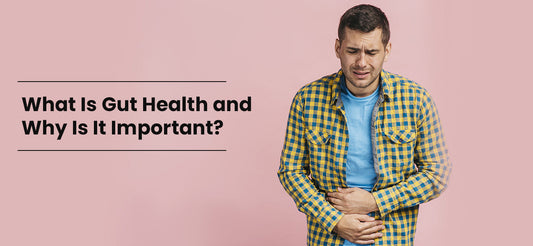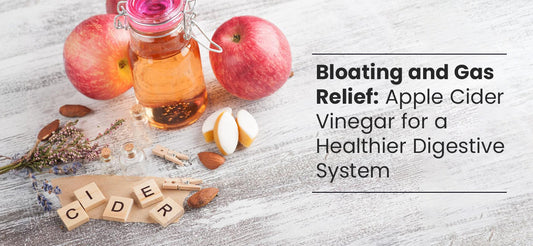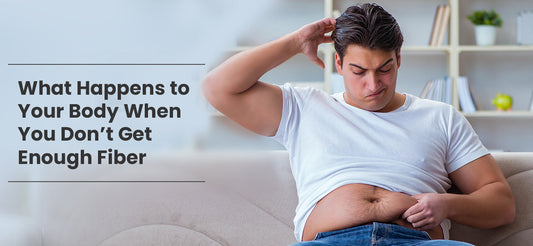Gut Health - Overview
Maintaining a healthy gut is essential for overall well-being. A balanced and thriving gut can improve digestion, boost the immune system, and support mental health. Fortunately, you can incorporate several simple and effective hacks into your daily routine to promote a healthy gut. In this blog post, we will explore 16 easy hacks that can help you improve your gut health and overall quality of life. [1,2]
16 Hacks for a Healthier Gut-
Eat a Balanced Diet
A balanced diet is vital to promoting a healthy gut. Include a variety of fruits, vegetables, whole grains, lean proteins, and healthy fats in your meals. These foods are fiber-rich, which helps regulate digestion and promote the growth of beneficial gut bacteria. Avoid excessive consumption of processed foods, refined sugars, and unhealthy fats, as they can disrupt the gut microbiome. [3]
Increase Fiber Intake
Fiber is crucial for a healthy gut as it nourishes the beneficial bacteria in your intestines. Incorporate fiber-rich foods such as whole grains, legumes, fruits, and vegetables into your diet. Additionally, consider adding a fiber supplement like psyllium husk to your routine. However, increasing your fiber intake is essential to prevent digestive discomfort gradually.[3]
Stay Optimally Hydrated
Drinking an adequate amount of water is essential for maintaining a healthy gut. Water helps soften the stool, making it easier to pass and preventing constipation. It also aids in the absorption of nutrients and supports the overall digestive process. Aim to drink at least eight glasses of water daily and adjust your intake based on your activity level and climate. [4]
Minimize or Manage Stress
Chronic stress can harm gut health. Stress can disrupt the balance of gut bacteria and impair digestion. Incorporate stress management techniques into your daily routine, such as meditation, deep breathing exercises, yoga, or engaging in hobbies you enjoy. Prioritizing self-care and finding healthy ways to manage stress can significantly improve your gut health. [5,6]
Get Enough Sleep & Quality Sleep
Sleep plays a vital role in maintaining a healthy gut. Aim for seven to eight hours of quality sleep each night. Lack of sleep can disrupt the gut microbiome, increase inflammation, and affect appetite-regulating hormones. Establish a regular sleep schedule, create a comfortable environment, and practice good sleep hygiene to promote optimal gut health. [7,8]
Exercise Regularly
Regular physical activity benefits your overall health and promotes a healthy gut. Exercise helps stimulate intestinal contractions, improving digestion and reducing the risk of constipation. Aim for at least 30 minutes of moderate-intensity exercise most days of the week. Choose activities you enjoy, such as walking, jogging, cycling, or dancing. [9,10]
Include Probiotic-Rich Foods in Your Daily Diet
Probiotics are beneficial bacteria that support a healthy gut. Incorporate fermented foods like yogurt, kefir, sauerkraut, kimchi, and kombucha into your diet. These foods are rich in live cultures that can help replenish and diversify the gut microbiome. Alternatively, consider taking a high-quality probiotic supplement, especially after antibiotics or during digestive distress. [11]
Consume Prebiotic Foods and Supplements
Prebiotics are non-digestible fibers that serve as food for the beneficial bacteria in your gut. Include garlic, onions, leeks, bananas, asparagus, and artichokes. These foods are naturally rich in prebiotics and can help nourish the gut microbiome. Adding prebiotic supplements, such as inulin or fructooligosaccharides, can also be beneficial. [12]
Avoid Antibiotic Overuse
While antibiotics can be life-saving, their overuse can disrupt the gut microbiome. Only take antibiotics when necessary and as prescribed by your healthcare provider. If you require antibiotics, consider taking a high-quality probiotic supplement afterward to help restore the balance of beneficial bacteria in your gut. [13]
Limit Alcohol Consumption
Excessive alcohol consumption can harm the gut lining and disrupt the balance of gut bacteria. Limit your alcohol intake to moderate levels or avoid it altogether. If you do drink alcohol, do so in moderation and make sure to stay well-hydrated. [14,15]
Quit Smoking
Smoking is detrimental to gut health and can increase the risk of various gastrointestinal conditions. Quitting smoking can have significant benefits for your gut and overall health. Seek support from healthcare professionals or join a smoking cessation program to help you quit successfully. [16]
Chew Your Food Thoroughly
Chewing food thoroughly aids digestion by breaking it down into smaller particles. This allows for better nutrient absorption and reduces the digestive system's strain. Aim to chew each bite of food at least 20-30 times before swallowing. [17]
Avoid Artificial Sweeteners
Artificial sweeteners like aspartame and sucralose can disrupt the gut microbiome and cause digestive issues. Opt for natural sweeteners like honey, maple syrup, or stevia instead. Be mindful of hidden sources of artificial sweeteners in processed foods and beverages. [18]
Manage Food Intolerances
Food intolerances can cause gut inflammation and digestive distress. Identify and manage food intolerances by working with a healthcare professional or keeping a food diary to track symptoms. Eliminate trigger foods from your diet and gradually reintroduce them to identify specific biases. [19]
Limit Processed Foods
Processed foods often contain unhealthy fats, added sugars, and artificial additives. These can disrupt the gut microbiome and contribute to various digestive issues. Opt for whole, unprocessed foods as much as possible to promote optimal gut health. [20]
Listen to Your Body
Lastly, listen to your body's cues and your gut. Trust your intuition when making food choices and determining portion sizes. Your body knows best what it needs to thrive, so tune in and honor its signals.
Conclusion
Improving your gut health doesn't have to be complicated. Incorporating these 16 easy hacks into your daily routine can promote a healthy gut and enhance your overall well-being. Remember that everyone's gut is unique, so it's essential to experiment and find what works best for you. Small changes can make a big difference, so start implementing these hacks today and enjoy the benefits of a thriving gut.
References
1. Madison A, Kiecolt-Glaser JK. Stress, depression, diet, and the gut microbiota: human-bacteria interactions at the core of psychoneuroimmunology and nutrition. CurrOpinBehav Sci. 2019 Aug;28:105-110. doi: 10.1016/j.cobeha.2019.01.011.
2. Patil, A.; Singh, N.; Pawar, N. The Dynamic Interplay Between Gut Health and Dietary Options: A Systematic Review. Preprints 2023, 2023080795.
https://doi.org/10.20944/preprints202308.0795.v1
3. Kumar, J., Rani, K. &Datt, C. Molecular link between dietary fibre, gut microbiota and health. MolBiol Rep 47, 6229–6237 (2020). https://doi.org/10.1007/s11033-020-05611-3
4. Popkin BM, D'Anci KE, Rosenberg IH. Water, hydration, and health. Nutr Rev. 2010 Aug;68(8):439-58. doi: 10.1111/j.1753-4887.2010.00304.x.
5. Konturek PC, Brzozowski T, Konturek SJ. Stress and the gut: pathophysiology, clinical consequences, diagnostic approach and treatment options. J PhysiolPharmacol. 2011 Dec;62(6):591-9. PMID: 22314561.
6. D’Silva, A., MacQueen, G., Nasser, Y. et al. Yoga as a Therapy for Irritable Bowel Syndrome. Dig Dis Sci 65, 2503–2514 (2020). https://doi.org/10.1007/s10620-019-05989-6
7. Neroni B, Evangelisti M, Radocchia G, Di Nardo G, Pantanella F, Villa MP, Schippa S. Relationship between sleep disorders and gut dysbiosis: what affects what? Sleep Med. 2021 Nov;87:1-7. doi: 10.1016/j.sleep.2021.08.003. Epub 2021 Aug 18. PMID: 34479058.
8. Matenchuk BA, Mandhane PJ, Kozyrskyj AL. Sleep, circadian rhythm, and gut microbiota. Sleep Med Rev. 2020 Oct;53:101340. doi: 10.1016/j.smrv.2020.101340.
9. Wegierska, A.E., Charitos, I.A., Topi, S. et al. The Connection Between Physical Exercise and Gut Microbiota: Implications for Competitive Sports Athletes. Sports Med 52, 2355–2369 (2022). https://doi.org/10.1007/s40279-022-01696-x
10. Nieman DC, Wentz LM. The compelling link between physical activity and the body's defense system. J Sport Health Sci. 2019 May;8(3):201-217. doi: 10.1016/j.jshs.2018.09.009.
11. Marco ML, Heeney D, Binda S, Cifelli CJ, Cotter PD, Foligné B, Gänzle M, Kort R, Pasin G, Pihlanto A, Smid EJ, Hutkins R. Health benefits of fermented foods: microbiota and beyond.CurrOpinBiotechnol. 2017 Apr;44:94-102. doi: 10.1016/j.copbio.2016.11.010. Epub 2016 Dec 18. PMID: 27998788.
12. Krumbeck, Janina A.; Maldonado-Gomez, Maria X.; Ramer-Tait, Amanda E.; Hutkins, Robert W.. Prebiotics and synbiotics: dietary strategies for improving gut health. Current Opinion in Gastroenterology 32(2):p 110-119, March 2016. | DOI: 10.1097/MOG.0000000000000249
13. Lucy McDonnell, Alexander Gilkes, Mark Ashworth, Victoria Rowland, Timothy Hugh Harries, David Armstrong & Patrick White (2021) Association between antibiotics and gut microbiome dysbiosis in children: systematic review and meta-analysis, Gut Microbes, 13:1, DOI: 10.1080/19490976.2020.1870402
14. Capurso G, Lahner E. The interaction between smoking, alcohol and the gut microbiome. Best Pract Res ClinGastroenterol. 2017 Oct;31(5):579-588. doi: 10.1016/j.bpg.2017.10.006. Epub 2017 Oct 22. PMID: 29195678.
15. Hartmann P, Seebauer CT, Schnabl B. Alcoholic liver disease: the gut microbiome and liver cross talk. Alcohol ClinExp Res. 2015 May;39(5):763-75. doi: 10.1111/acer.12704. PMID: 25872593; PMCID: PMC4402724.
16. Huang, C., Shi, G. Smoking and microbiome in oral, airway, gut and some systemic diseases. J Transl Med 17, 225 (2019). https://doi.org/10.1186/s12967-019-1971-7
17. Cherpak CE. Mindful Eating: A Review Of How The Stress-Digestion-Mindfulness Triad May Modulate And Improve Gastrointestinal And Digestive Function. Integr Med (Encinitas). 2019 Aug;18(4):48-53. PMID: 32549835; PMCID: PMC7219460.
18. Chattopadhyay S, Raychaudhuri U, Chakraborty R. Artificial sweeteners - a review. J Food Sci Technol. 2014 Apr;51(4):611-21. doi: 10.1007/s13197-011-0571-1. Epub 2011 Oct 21. PMID: 24741154; PMCID: PMC3982014.
19. Ohtsuka Y. Food intolerance and mucosal inflammation. Pediatr Int. 2015;57(1):22-9. doi: 10.1111/ped.12546. PMID: 25442377.
20. Lisa Miclotte& Tom Van de Wiele (2020) Food processing, gut microbiota and the globesity problem, Critical Reviews in Food Science and Nutrition, 60:11, 1769-1782, DOI: 10.1080/10408398.2019.1596878









